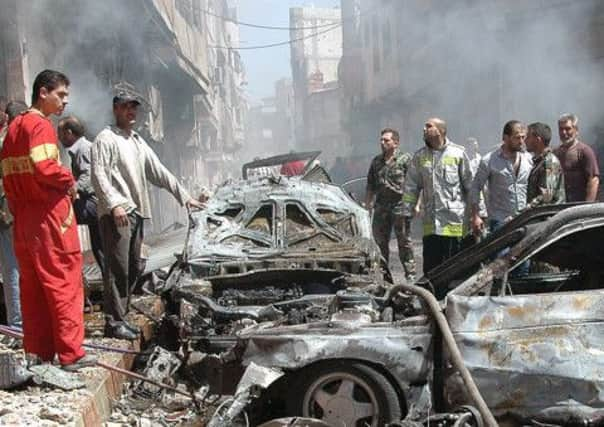Car bomb and mortar attacks kill dozens in Syria


A car bomb killed 36 people in the central city of Homs yesterday, while a series of mortar shells hit central Damascus, killing at least 14 others.
The attacks came a day after president Bashar al-Assad announced his candidacy for the presidential election on 3 June, a race he is likely to win amid a civil war that started as a peaceful uprising against his rule.
Advertisement
Hide AdAdvertisement
Hide AdThe car bombing in Homs, in a predominantly Alawite district, left more than 85 people wounded, most of them civilians. Syrian state television said the car bomb exploded near the Zahra district, causing “a large number” of casualties.
In Damascus earlier in the day, four shells struck the predominantly Shiite neighbourhood of Shaghour, according to the official Sana news agency. State TV said 14 people were killed and 86 wounded.
An official at Damascus Police Command said two of the mortar shells landed near a religious school, and several students were among those killed and wounded in the attack.
No-one immediately claimed responsibility for the attack, but Syria’s rebels have frequently fired mortars into the capital from opposition-held suburbs.
The Sana news agency blamed the attacks on “terrorists” – a term used by the Assad regime for rebels fighting to oust him.
The Syrian Observatory for Human Rights, a British-based opposition activist group, said 17 people were killed. The group, which has a network of activists on the ground in Syria, said the death toll is likely to rise because of the many wounded.
Many of the opposition-held neighbourhoods around Damascus have been under a crippling government blockade for months, with no food or medicines reaching the civilians trapped inside.
Earlier, Human Rights Watch accused Mr Assad’s forces of indiscriminately targeting civilians by using crude “barrel bombs” in rebel-held districts of the northern city of Aleppo.
Advertisement
Hide AdAdvertisement
Hide AdThe organisation said its staff had documented 85 locations in Aleppo’s opposition-held districts that government aircraft hit with the makeshift devices – barrels packed with shrapnel and explosive, which are dropped from helicopters.
Human Rights Watch also said it has evidence that government forces fired hundreds of mortar and heavy artillery shells during more than 40 days between February and April.
Aleppo, Syria’s largest city, has been carved up into rebel-held and government-held neighbourhoods since the opposition launched an offensive in the north in mid-2012.
The air campaign on Aleppo has been relentless in the past months as government forces try to wrest the city from the rebels before the June vote.
Nadim Houry, deputy Middle East and North Africa director at Human Rights Watch, said: “President Assad is talking about elections, but for Aleppo’s residents, the only campaign they are witnessing is a military one of barrel bombs and indiscriminate shelling.”
In New York, the United Nations Security Council meets today to review whether both sides in Syria are complying with a UN resolution demanding an end to the use of barrel bombs and other weapons in populated areas.
Meanwhile, four more people announced their candidacy for the presidential election, state TV said, bringing the number of hopefuls to ten, though critics have said they are only running to give the election the impression of legitimacy.
Syria’s opposition and its Western backers have attacked the decision to hold the elections amid the country’s three-year conflict, which has killed more than 150,000 people and driven a third of the country’s population from their homes.
Syria’s foreign ministry said the decision was “sovereign” and warned “no foreign power will be allowed to intervene”.